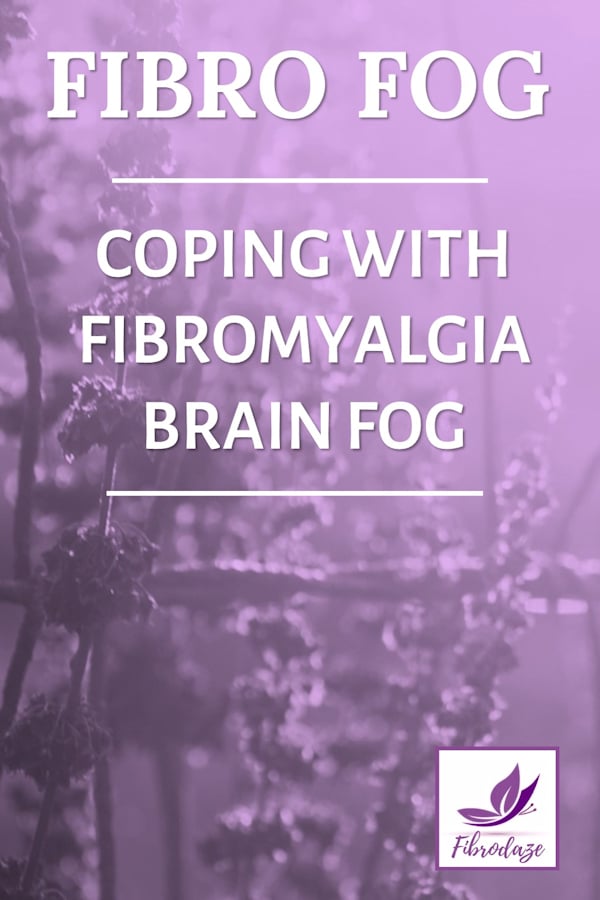Fibro fog is the term used to describe the brain fog or cognitive dysfunction associated with fibromyalgia. It is the feeling of being in a daze, making it difficult to take in and process information. For some people, fibro fog can be more of a disability than the physical symptoms of fibromyalgia.

According to the National Fibromyalgia and Chronic Pain Association, research shows there really is a problem with cognitive dysfunction in FM patients. The cognitive function of fibromyalgia patients were equivalent to that of adults who were twenty years older than FM patients on several tests.
What Causes Fibro Fog
What causes fibro fog is still unknown. It is apparent there is no real problem with the mental capacities of people suffering from fibrofog. The theory is there must be underlying problems that cause cognitive dysfunction. A number of factors could be at the root of these cognitive impairments.
These factors include:
- Chronic Pain – Chronic pain can affect the hippocampus, a region of the brain critical for learning, memory and emotional processing. Processing constant pain signals can be overwhelming, causing increased stress, which also contributes to short-term memory loss. (You can read 9 ways to manage chronic pain here.)
- Sleep Disorders – The inability to get deep restorative sleep impairs the ability to maintain normal mental efficiency and to recall information.
- Not Enough Oxygen – Brain scan studies show that sometimes people with fibromyalgia do not receive enough oxygen in parts of their brain. One possible reason is that part of their nervous system is out of balance, causing changes in the brain’s blood vessels.
- Decreased Blood Flow – Studies show that fibromyalgia can cause decreased blood flow to certain areas of the brain responsible for creating short-term memories. This lack of blood flow may prevent the brain from adequately creating new memories.
- Premature Brain Aging – Researchers have found that fibro fog sufferers lose three times as much brain tissue per year than healthy people in the same age bracket. Some of the losses occur in areas of the brain that control memory and concentration.
- Depression – A large percentage of people with fibromyalgia also suffer from anxiety and depression. Depression and memory loss seem to be linked. Depression lowers the levels of serotonin in the brain, preventing new memories from being processed.
- Medications – A lot of common medications used for fibromyalgia contribute to brain fog.
Brain fog is usually worse when the pain and fatigue are worse. It can be exacerbated when you are anxious, feeling rushed or dealing with sensory overload.
Symptoms Of Fibro Fog
The symptoms of fibro fog can range from mild to severe. They frequently vary from day-to-day. Symptoms of fibro fog may include:
- Trouble With Words – Difficulty recalling words or names, the use of incorrect words, trouble holding conversations, understanding conversations, and expressing thoughts
- Short-term Memory Problems – Forgetfulness, difficulty remembering where you put things or remembering plans, forgetting what you are doing, unable to recall what was heard or read
- Trouble Concentrating – Easily distracted, trouble processing information, inability to pay attention to more than one thing at a time, unable to complete a task
- Trouble With Numbers – Difficulty performing simple math, transposing numbers, trouble remembering numbers
- Getting Lost – Not knowing where you are going or where you are, not recognizing your surroundings, impaired sense of direction
Experiencing fibro fog can be frustrating and stressful. I hate the brain fog more than the pain and fatigue. My anxiety goes through the roof when I can’t concentrate, feel distracted, mix up words and am unable to form a complete sentence.
Tips To Cope With Fibro Fog
So, what can you do when you are feeling confused and forgetful? The most important thing to do is to STAY CALM. When my mental capabilities are dimmed by fibro fog, it scares the heck out of me. But it also lets me know it is time to slow down.
Here are 12 tips to help cope with fibro fog:
- Rest – Respect your body’s need for rest. Overactivity (physical or mental) can worsen cognitive functions, so it may be important to take frequent rest breaks. Frequent rest breaks can actually help prevent fibro fog and other flare-ups associated with fibromyalgia.
- Follow A Routine – Establish a daily routine for simple tasks. Doing things in a predictable manner will help reduce fibro fog.
- Stay Organized – Find a system that helps you stay on top of things. Create daily to-do lists. Use a planner to keep track of appointments. Use a weekly pill-box to keep track of medications.
- De-Clutter – A cluttered environment can be overwhelming and distracting, cause additional stress and make brain fog worse. Organize your home so that everything has a designated place.
- Avoid Multi-Tasking – Focus on one thing at a time. It is harder to concentrate when you’re trying to do too much at once.
- Avoid Over Stimulation – Since one of the causes of fibro fog is over stimulation, find ways to limit sensory input. For example, if you are hypersensitive to noise, move to a quiet place to avoid distractions.
- De-Stress – Stress may cause fibro fog to worsen. Stress relievers like meditation, restorative yoga, listening to music or reading can help improve fibro fog.
- Breathe – People with fibromyalgia tend to be shallow breathers. Practice deep breathing when struggling with fibro fog to increase blood flow and oxygen levels in the brain.
- Exercise Regularly – Exercise not only improves blood flow, but also helps improve sleep, which can help alleviate some of the cognitive difficulties associated with fibromyalgia.
- Improve Sleep – Lack of restorative sleep can cause and exacerbate cognitive problems. Getting quality sleep is the most important treatment for improving most, if not all of the symptoms of fibromyalgia. (You may want to read this post about improving sleep with fibromyalgia.)
- Take Care of Nutritional Needs – Cognitive functions will improve with a healthy diet. Avoid processed foods, gluten, sugar, caffeine and various food additives and preservatives which can make pain and brain fog worse. Optimizing your intake of B vitamins, omega 3 and magnesium will also help improve cognitive function.
- Play Games – Puzzles, brain teasers and some video games can help improve critical thinking skills and improve memory.
Some of the symptoms associated with fibro fog can actually be a side effect of your medications. Read the labels and check with your doctor about adjusting dosage levels or changing to other medications. You may also want to discuss medications or supplements such as Ginkgo biloba, that increase attention, and concentration.
Conclusion
Brain fog is a common symptom of fibromyalgia. Studies show that cognitive dysfunction is more related to pain. Depression, anxiety and other factors do not necessarily influence the level of cognitive decline. Fibro fog can be debilitating. Researchers are working to find a solution.
Until then, all we can do is take care of our self: eat healthily, exercise, relax and try not to over-do.
Pin for Later






And now six months later another email 🙂 Thank you so much for this info! I have just finished lunch with my family and it was great. But during lunch my fibro fog started. I said 3 sentences and couldn’t complete it. Just blank. Then I start another sentence and my words are mixed up. This is once of the worst flare ups I have ever had. Feels like I was having a stroke. Then I sat down by myself and traced my steps back to this morning and realised that I had a fight with my mother this morning. In my family that is such a rare occasion. Thus, I believed there was underlying anxiety that triggered my flare up. Hate it. But hey, you either accept it and carry on, or go under. It is wonderful that there are people out there sharing what they go through and know that I am not alone. Riana